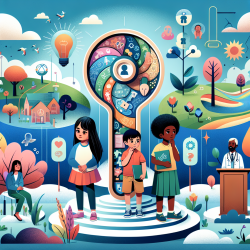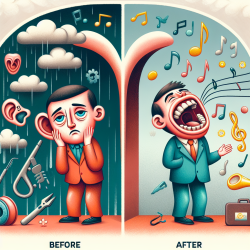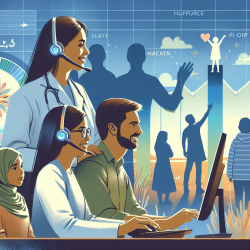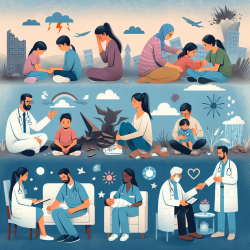Introduction
The COVID-19 pandemic has profoundly impacted the psychological well-being of individuals worldwide. A recent study titled "Belief in a Just World, Perceived Control, Perceived Risk, and Hopelessness during the COVID-19 Pandemic: Findings from a Globally Diverse Sample" provides valuable insights into how belief in a just world (BJW) can serve as a psychological resource during such uncertain times. As practitioners in speech language pathology, understanding these findings can enhance our therapeutic approaches and improve outcomes for children.
Understanding the Study
The study explored the relationships between BJW, perceived control, perceived risk, and hopelessness during the early stages of the COVID-19 pandemic. The just-world hypothesis suggests that people need to believe in a just world where they get what they deserve. This belief can be a significant psychological resource, especially during crises.
Data was collected from 1,250 participants across six countries. The study found that stronger personal and general BJW, along with higher perceived control over the pandemic, predicted lower levels of hopelessness. Conversely, higher perceived risk to oneself increased hopelessness, while perceived risk to others decreased it.
Implications for Practitioners
For speech language pathologists, these findings highlight the importance of fostering a sense of control and a positive outlook in children. Here are some actionable steps practitioners can take:
- Encourage Positive Beliefs: Reinforce the idea that the world can be a just place, which can help children feel more secure and hopeful about their future.
- Enhance Perceived Control: Provide children with strategies to manage their environment and actions, thereby increasing their sense of control.
- Address Perceived Risks: Help children understand risks in a balanced way, reducing unnecessary fear while promoting safety.
Further Research Opportunities
While this study provides a foundation, further research is needed to explore the nuances of BJW in different contexts and its impact on therapy outcomes. Practitioners are encouraged to conduct or participate in studies that examine these variables in diverse populations and settings.
Conclusion
Belief in a just world can be a powerful tool in speech language therapy, especially during times of uncertainty. By integrating these insights into practice, we can better support children in developing resilience and hope for the future.
To read the original research paper, please follow this link: Belief in a just world, perceived control, perceived risk, and hopelessness during the COVID-19 pandemic: Findings from a globally diverse sample.










